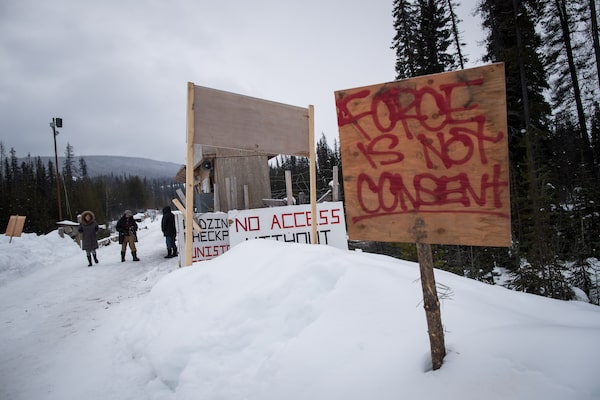
A checkpoint is seen at a bridge leading to the Unist'ot'en camp on a remote logging road near Houston, B.C., on Jan. 17, 2019.DARRYL DYCK/The Canadian Press
RCMP will be cleared by the end of this week to enforce a court injunction against protesters who are opposed to TC Energy Corp.'s $6.6-billion Coastal GasLink pipeline project in northern British Columbia.
Coastal GasLink launched its court case against protesters in November, 2018, arguing that defendants Freda Huson and Warner Naziel are the architects behind the Unist’ot’en camp located near Houston, B.C.
Unist’ot’en is affiliated with Dark House, one of 13 Wet’suwet’en Nation hereditary house groups.
On Dec. 31, a B.C. Supreme Court judge extended an injunction against protesters, saying construction of the natural gas pipeline has been harmed by Wet’suwet’en blockades.
Wet’suwet’en hereditary leaders will likely have until late Thursday or early Friday to remove any obstacles that would prevent workers from getting to their construction sites on one section of the route, said Michael Lee Ross, a lawyer who represents Ms. Huson and Mr. Naziel.
Enforcement of the injunction order "gives the defendants and anybody else affected by the order 72 hours to remove any structures in the way or whatever,” Mr. Ross said in an interview on Monday. “If after 72 hours that hasn’t been done, in certain cases the company can remove an obstacle.”
Coastal GasLink said on Sunday that its staff discovered trees felled along a remote B.C. logging road that leads to the Unist’ot’en camp, adding that the fallen trees are preventing contractors from returning to work. As well, Dark House issued an “eviction notice” to Coastal GasLink on Saturday and is cancelling an agreement that had allowed pipeline workers to cross the Morice River Bridge last year to reach construction sites.
On Jan. 7, 2019, RCMP arrested 14 protesters at a police checkpoint along the B.C. logging road. Those arrests garnered international media coverage.
“Absent some other circumstances, such as maybe what happened last January, when there were people actually blockading, the onus would be on the company to remove obstructions that are in the way. That’s not an RCMP job,” Mr. Ross said.
Coastal GasLink started clearing land last year to make room for work camps along the 670-kilometre route from northeast B.C. to a West Coast terminal for exporting liquefied natural gas. The $18-billion terminal in Kitimat, B.C., is being built by LNG Canada, the Royal Dutch Shell PLC-led consortium.
All 20 elected First Nation councils along the route support Coastal GasLink. But eight Wet’suwet’en hereditary house chiefs, including Mr. Naziel, have led a campaign to oppose the pipeline project.
Coastal GasLink said on Monday that it “continues to remobilize construction crews across the right-of-way in anticipation of work resumption and ramp-up this week.” RCMP didn’t return calls for comment.
Wet’suwet’en hereditary leaders say they aren’t fighting just Coastal GasLink, but also battling other pipeline proposals that would go through their unceded territory.
Molly Wickham, a hereditary wing chief (sub-chief) with the Wet’suwet’en’s Grizzly House, said in a recent interview that she is concerned about the petroleum industry’s push to establish an energy corridor for pipelines from Alberta to British Columbia’s northern coast.
“Industry phrases it as an energy corridor, but we say no,” said Ms. Wickham, who also goes by Sleydo’ as her hereditary name. “For the Wet’suwet’en, it’s the hereditary clan system that makes decisions on our territory, not the elected band councils.”
The proposed Pacific Trail Pipeline would follow a 480-kilometre route from Summit Lake near Prince George in the B.C. Interior to the planned Kitimat LNG facility at Bish Cove, located near LNG Canada’s construction site in Kitimat.
The planned Pacific Trail is co-owned by California-based Chevron Corp. and Australia’s Woodside Petroleum Ltd. Chevron announced last month that it will sell its 50-per-cent interest in a proposed LNG export terminal at Bish Cove and also seek a buyer for its 50-per-cent stake in Pacific Trail.
Pacific Trail has the support of all 16 elected First Nations councils along the route. Those councils are represented by First Nations LP.
Mark Podlasly, chairman of First Nations LP, said complex issues on Indigenous rights and title are difficult to resolve in British Columbia, where most of the provincial Crown land isn’t covered by treaties.
“The band structure is a colonial-imposed structure. It does not necessarily represent what the community sees itself as,” said Mr. Podlasly, who is a member of the Cook’s Ferry Indian Band in the B.C. Interior. “How is that reconciled? That is a challenge that has to be addressed, and there’s no easy answer.”
Your time is valuable. Have the Top Business Headlines newsletter conveniently delivered to your inbox in the morning or evening. Sign up today.
 Brent Jang
Brent Jang